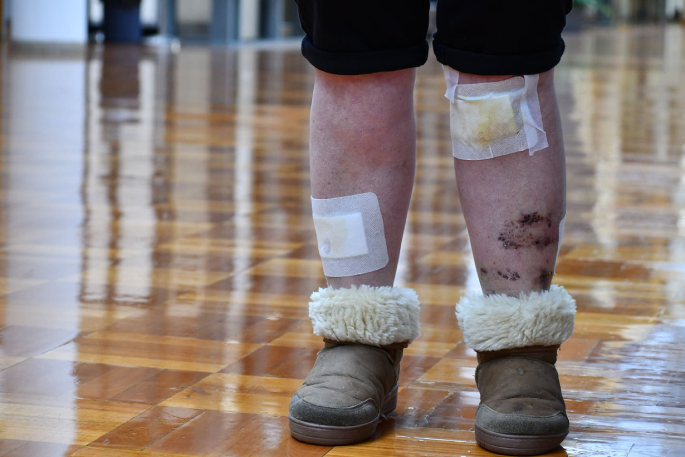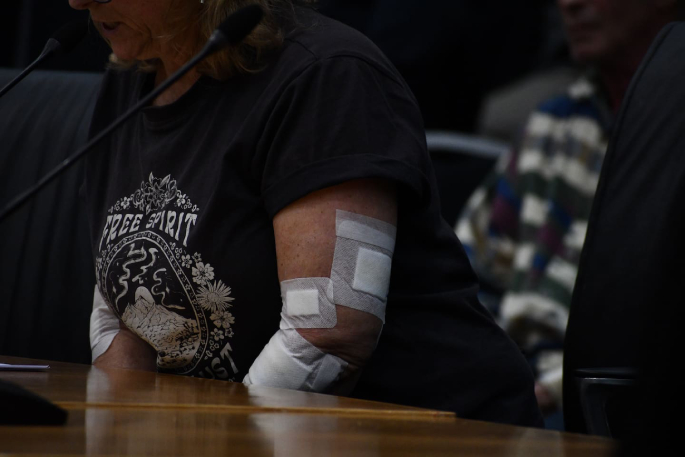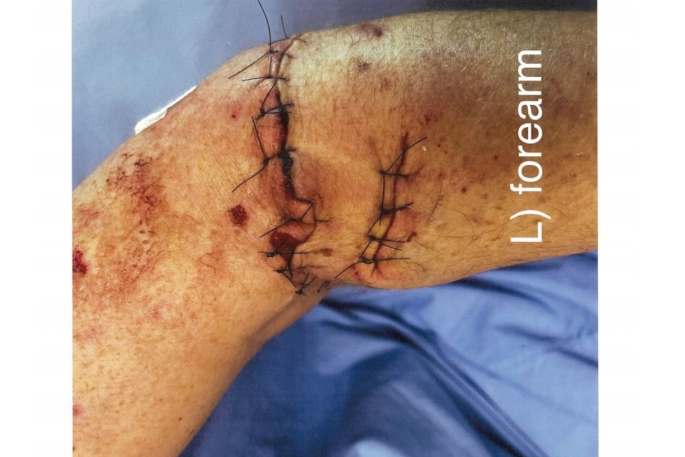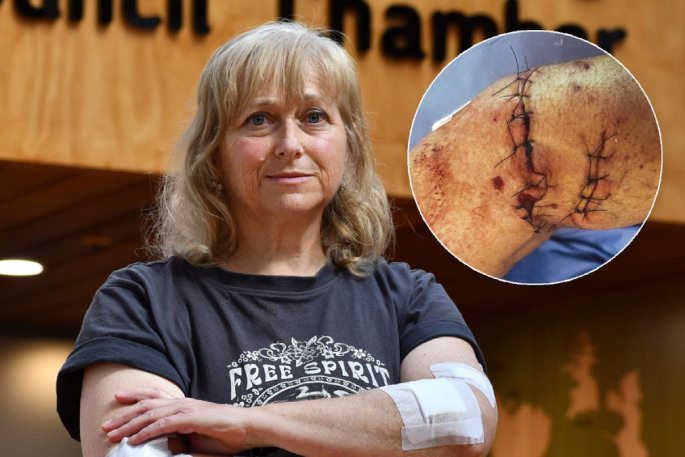Warning: Graphic images
“It felt like I was being ripped to shreds … I felt their intention and their instinct was to kill me.”
A woman mauled by three roaming dogs in a Rotorua street this month has spoken publicly to lobby for stricter rules and enforcement, saying she believes her “local council allowed these dogs to almost kill me”.
Suz Guet, still healing from wounds suffered in the September 3 attack in Sunset Rd, shared her experience at a Rotorua Lakes Council dog control bylaw and policy hearing on Wednesday.
At the meeting, Guet wore slippers because of her swollen, bruised feet, and her arms and legs were covered in dressed bite wounds.
She described how she needed 40 sutures, had 50cm of scarring and lost a litre of blood after the pack of “pig dogs” attacked her on a walk.
Guet said she counted herself fortunate to be in council chambers, and said if she had not been able to fight back with her bag, she could have been killed.
She told councillors more dog control staff and resources were needed, and that she believed the council must invest and prioritise dog regulation and enforcement to enable people’s safety.
 At the meeting with councillors, Suz Guet wore slippers because of her swollen, bruised feet. Photo / Laura Smith
At the meeting with councillors, Suz Guet wore slippers because of her swollen, bruised feet. Photo / Laura Smith
In her view, fines were low and there was a lack of strict laws and enforcement.
“Rotorua’s local council allowed these dogs to almost kill me.”
She believed higher fines would act as a disincentive to “negligent dog owners”.
“Make irresponsible dog owners pay.”
The fine for failing to keep a dog controlled or confined was $200.
Fine amounts for out-of-control dogs are determined by central government through legislation, while it is the council that enforces it.
She wanted clearer information on whether pig dogs or hunting dogs were classified as working dogs. Pig dogs, she said, were extremely fit, trained to kill and adrenalin-fuelled.
Guet wanted greater regulation and enforcement to ensure properties containing dogs were “doubly secure”, particularly for pig dogs, and wanted them caged when the owners were not home.
She also believed hunting dogs should not be within 2km of schools, rest homes, disability residential services, playgrounds and recreational reserves.
 Suz Guet's arms were bitten in the attack. Photo / Laura Smith
Suz Guet's arms were bitten in the attack. Photo / Laura Smith
In her view, fines were low and there was a lack of strict laws and enforcement.
“Rotorua’s local council allowed these dogs to almost kill me.”
She believed higher fines would act as a disincentive to “negligent dog owners”.
“Make irresponsible dog owners pay.”
The fine for failing to keep a dog controlled or confined was $200.
Fine amounts for out-of-control dogs are determined by central government through legislation, while it is the council that enforces it.
She wanted clearer information on whether pig dogs or hunting dogs were classified as working dogs. Pig dogs, she said, were extremely fit, trained to kill and adrenalin-fuelled.
Guet wanted greater regulation and enforcement to ensure properties containing dogs were “doubly secure”, particularly for pig dogs, and wanted them caged when the owners were not home.
She also believed hunting dogs should not be within 2km of schools, rest homes, disability residential services, playgrounds and recreational reserves.

Guet previously spoke to the Rotorua Daily Post anonymously.
After her submission, she told Local Democracy Reporting she decided to share her story in the meeting because the council needed to consider the points from someone who had been attacked.
Support had come from friends, her workplace, and strangers on social media.
She was nervous to speak, but said it was important for her people were aware of the issue.
What the council proposes to change
The bylaw and policy review proposed changes including building a dog DNA database to identify dogs during investigations and to enforce desexing where the council has a record of the dog being out of control within the previous year.
The council’s consultation website says these steps were intended to provide council staff with more tools to keep people and animals safe from dangerous or menacing dogs.
“Council currently uses DNA testing as an investigative tool to assist in proving or disproving a dog(s) involvement in serious attacks on people and other animals. It is showing to be an effective investigative tool that enables council to prosecute irresponsible dog owners, and secure appropriate outcomes for the offender and victims including the recovery of costs.
“In recent years council has seen an increase in the number of unwanted roaming dogs. Dog owners who chose not to desex their animals contribute to this issue. By enforcing the desexing of uncontrolled dogs, council hopes to reduce the number of offending dogs as well as unwanted animals that end up in our pound.”
In a statement last week, a council spokesperson confirmed all three dogs involved had been euthanised “with the full co-operation of the owner”.
“An active investigation is under way. The dogs’ owner has been made aware ...”
The spokesperson said the dogs were registered for the 2023-24 registration year, but registration had not been completed for the 2024-25 year, with the due date being June 30.
Laura Smith is a Local Democracy Reporting journalist based at the Rotorua Daily Post. She previously reported general news for the Otago Daily Times and Southland Express, and has been a journalist since 2019.
LDR is local body journalism co-funded by RNZ and NZ On Air.




0 comments
Leave a Comment
You must be logged in to make a comment.